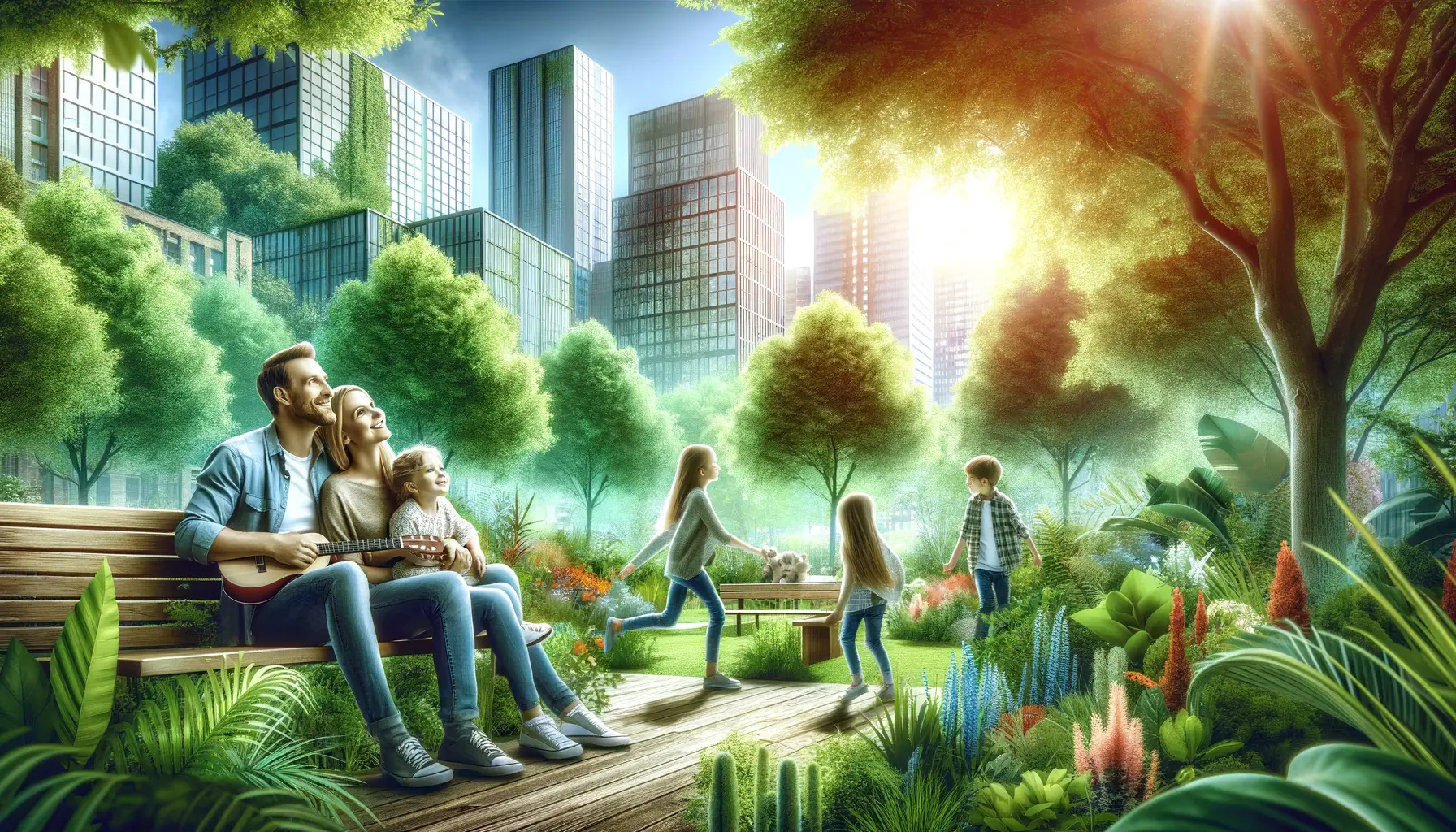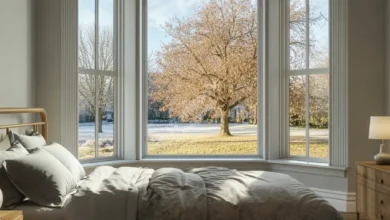Green Spaces and Mental Health: Nature’s Healing Power

The Impact of Green Spaces on Mental Health
Did you know that spending just 20 minutes in a park can significantly boost your happiness and well-being? In our fast-paced urban lives, we often overlook the power of nature to heal our minds. Let’s explore how green spaces can be your secret weapon against stress and anxiety!
Introduction
Imagine stepping out of your busy office into a lush, green park. The tension in your shoulders eases, your breathing slows, and a sense of calm washes over you. This isn’t just your imagination – it’s the very real impact of green spaces on our mental health.
In a world where concrete jungles dominate our landscapes, green spaces are becoming increasingly crucial for our well-being. These natural havens offer a respite from the hustle and bustle of city life, providing a much-needed connection to nature that our minds and bodies crave.
What Are Green Spaces?
Green spaces are more than just pretty patches of grass. They’re vital components of our urban environments that can dramatically improve our quality of life. But what exactly qualifies as a green space?
Green spaces include:
- Public parks and gardens
- Community gardens
- Urban forests and woodlands
- Green corridors (like tree-lined streets)
- Wetlands and water features
- Even green roofs and walls on buildings!
These areas have been part of urban planning for centuries. In fact, the concept of public parks dates back to ancient civilizations. The Hanging Gardens of Babylon, one of the Seven Wonders of the Ancient World, is an early example of integrating nature into urban settings.
Fast forward to the 19th century, and we see the birth of modern urban parks. New York’s Central Park, designed in 1858, set a new standard for urban green spaces, inspiring cities worldwide to create similar natural retreats for their residents.
The Mental Health Crisis in Modern Society
While our cities have grown and technology has advanced, our mental health seems to be declining. The fast-paced, high-stress nature of modern life is taking a toll on our psychological well-being.
Common mental health issues in urban areas include:
- Chronic stress
- Anxiety disorders
- Depression
- Burnout
The statistics are alarming. According to the World Health Organization, depression affects over 264 million people globally, with higher rates in urban areas. In the United States, nearly 1 in 5 adults experience mental illness each year, with rates even higher in large cities.
The good news? Nature might be the prescription we need. Green spaces offer a simple yet powerful way to combat these mental health challenges. In the next sections, we’ll dive deeper into how spending time in nature can boost your mood, reduce stress, and improve your overall mental well-being.
How Green Spaces Benefit Mental Health
Nature isn’t just beautiful – it’s a powerful tool for improving our mental well-being. Let’s explore the many ways green spaces can boost our psychological health.
Stress Reduction: Nature’s Chill Pill
Feeling overwhelmed? A dose of nature might be just what the doctor ordered. Research shows that spending time in green spaces can significantly lower our stress levels.
- Cortisol Control: Exposure to nature lowers cortisol, our body’s primary stress hormone. A study in the International Journal of Environmental Health Research found that just 20-30 minutes in a park can reduce cortisol levels by about 10%.
- Quick Relief: Even brief encounters with nature can help. A 2019 study revealed that just 10 minutes in a natural setting can reduce the physical and mental effects of stress.
Improved Mood and Emotional Well-being: Nature’s Happy Hour
Green spaces don’t just reduce negative feelings – they actively boost positive ones too!
- Natural Mood Boosters: Time in nature increases the production of serotonin and dopamine, our brain’s “feel-good” chemicals.
- Mood-Lifting Activities: Try these nature-based activities to lift your spirits:
- Forest bathing (mindful walks in the woods)
- Gardening
- Outdoor yoga or meditation
- Bird watching
- Picnicking in a park
Enhanced Cognitive Function: Brain Food from Mother Nature
Did you know that nature can make you smarter? Well, sort of. Green spaces have been shown to enhance various cognitive functions.
- Attention Restoration Theory: This concept suggests that nature helps our brains recover from the mental fatigue caused by focused work or urban environments.
- Creativity Boost: A 2012 study found that hikers on a four-day nature trip showed a 50% improvement in creative problem-solving tasks.
- Improved Focus: Research indicates that children with ADHD show improved concentration after spending time in green spaces.
Physical Health Benefits That Impact Mental Health
The mind-body connection is real, and the physical benefits of green spaces directly contribute to better mental health.
Green spaces can improve your physical health by:
- Encouraging physical activity
- Improving air quality
- Reducing noise pollution
- Regulating temperature in urban areas
These physical benefits lead to mental health improvements such as:
- Better sleep quality
- Increased vitamin D levels (boosting mood and immune function)
- Reduced inflammation (linked to depression and anxiety)
- Enhanced overall well-being through regular exercise
By providing opportunities for both relaxation and activity, green spaces offer a holistic approach to health that benefits both body and mind.
Accessibility and Equity in Green Spaces
While green spaces offer numerous benefits, not everyone has equal access to these natural havens.
- Urban Planning Challenges: Many cities struggle with uneven distribution of green spaces, often leaving lower-income areas with less access to nature.
- Potential Solutions:
- Community gardens in underserved neighborhoods
- Converting vacant lots into mini-parks
- Green corridors connecting different parts of the city
- Rooftop gardens on public buildings
Incorporating Green Spaces into Daily Life
You don’t need to live next to a national park to reap the benefits of nature. Here are some practical tips for urban dwellers:
- Take your lunch break in a nearby park
- Start a small balcony or windowsill garden
- Join a community garden project
- Use green spaces for your workout routine
- Plan weekend hikes or nature walks
The Role of Green Spaces in Mental Health Treatment
Healthcare professionals are increasingly recognizing the therapeutic potential of nature:
- Ecotherapy: This growing field uses nature-based interventions as part of mental health treatment plans.
- Green Prescriptions: Some doctors now “prescribe” time in nature to help manage conditions like anxiety and depression.
- Nature-Based Programs: Many mental health facilities are incorporating green spaces into their treatment environments.
Future of Green Spaces and Mental Health
As we look ahead, the importance of green spaces in urban planning is set to grow:
- Biophilic Design: This architectural approach integrates nature into buildings and city planning.
- Smart Parks: Technology is being used to enhance park experiences and gather data on usage patterns.
- Virtual Reality: For those with limited mobility, VR nature experiences might offer some of the benefits of green spaces.
Conclusion
The power of green spaces to improve our mental health is clear. From reducing stress and boosting mood to enhancing cognitive function, nature offers a simple yet effective way to support our psychological well-being.
As we face growing mental health challenges in our urban environments, it’s crucial that we prioritize the creation, maintenance, and equitable distribution of green spaces. These natural oases aren’t just nice to have – they’re essential for our collective mental health.
So, next time you’re feeling stressed, anxious, or just need a mood boost, remember that relief might be as close as your nearest park. Take a step towards better mental health today by spending some time in nature. Your mind will thank you!



